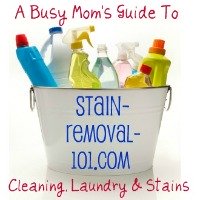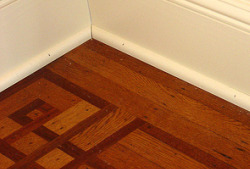
|
Hardwood Floor Cleaners - What You Need To KnowThere are lots of hardwood floor cleaners out there you can buy, and also lots of recipes floating around that you can make yourself. The question is, which ones actually work and which ones just waste your money and time? This article explains the pros and cons of various cleaners, and also explains which ones you should not use. Ingredients You Should Avoid In Hardwood Floor CleanersYou should avoid cleaners that are alkaline in nature, such as ammonia or cleaners which contain ammonia. They will dull the finish. You should also choose a cleaner that does not have abrasives in it, because the abrasives can scratch the floor and finish. Finally, you should not use a cleaner that contain oils, such as can be found in some sprays that you can use for dusting and cleaning wood furniture, because they will make the floor slippery which can be dangerous. (Please note that Murphy Oil Soap, which I discuss below, has a deceiving name and does not actually have any oil in it, meaning it is safe for hardwood floors.) Commercial CleanersThere are lots of different types of commercial cleaners. The three I have listed below, Bona, Bruce, and Murphy Oil Soap, are some of the most popular though. Each of these has their merits, and disadvantages. The biggest disadvantage of these, in my opinion, is cost in comparison to the homemade version I have listed below. However, the big advantage of at least the versions of each of these that come ready to use in spray bottles is that all you have to do is spray and clean, instead of having to mix it yourself. These products claim, also, that they protect the urethane finish of the hardwood floor better than homemade products because of their special formulations. Homemade Hardwood Floor Cleaner RecipeWhen cleaning a urethane finished hardwood floor it is best to use a mild soap or detergent that has a neutral or near neutral pH, and that will not leave a residue behind on your floor. The best homemade cleaner is a teaspoon or two of dishwashing liquid in a bucket full of warm water. When mixing your cleaner you want a few bubbles, but avoid using too much soap or detergent because it will make your floor harder to rinse, and a sticky soap film will result. A soapy residue on your hardwood floors will dull the finish, and will also make the floor slightly sticky which causes dirt to cling to the surface more tightly than it otherwise would have. Basically, be careful not to use too much soap or you will create a dirt magnet from the soap residue. Do Not Use Vinegar And WaterAs explained in more detail here, you should not use vinegar and water to clean your hardwood floors, because it just doesn't work well. Want To Learn How To Clean Your Hardwood Floors With The Cleaner You Have Selected? Read this article on how to clean hardwood floors, with an instructional video. Related Pages You May EnjoyHow To Clean Things Around The House Go From Hardwood Floor Cleaners To Home Page |
Let's Stay Connected!Visit My Other WebsitesStain-Removal-101.com
Home-Storage-Solutions-101.com
|
|

|
||
|
Return To Top | Home Page | Blog | Newsletter | Contact Me | About Me | Sitemap | Privacy Policy | Disclaimer | Disclosure | ||
|
Copyright © 2008 - 2025 - Flanery Companies, LLC - All Rights Reserved
| ||

Share Your Comments, Thoughts & Ideas